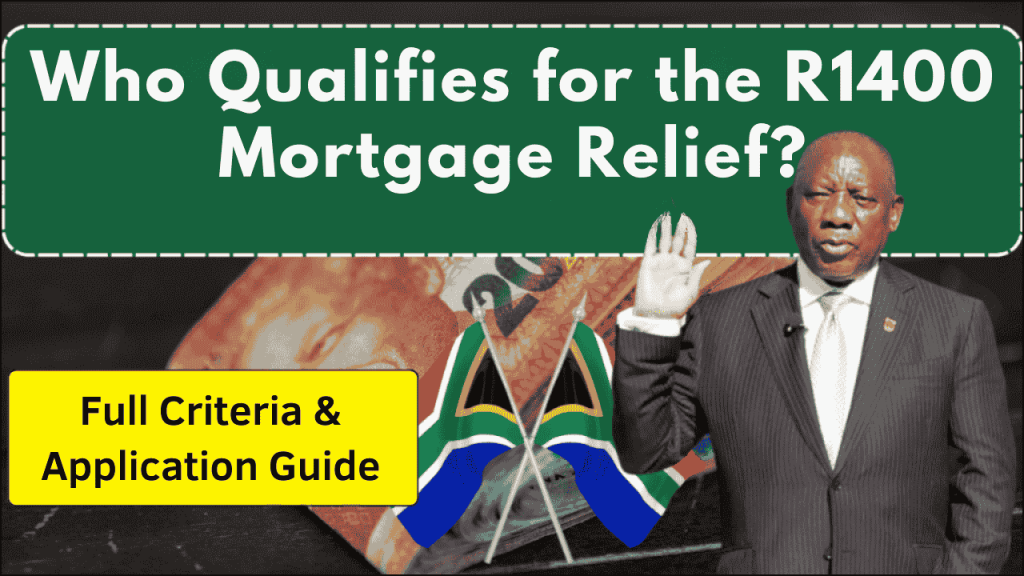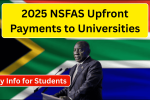
As of May 2025, South Africa continues to implement a substantial financial assistance program designed to support homeowners struggling with mortgage payments. The R1400 monthly mortgage relief grant provides critical support to qualifying homeowners amid rising living costs, elevated interest rates, and ongoing economic challenges. This comprehensive guide details eligibility requirements, application procedures, and key considerations for potential applicants.
What Is the R1400 Mortgage Relief Program?
The R1400 Mortgage Relief initiative is a government-backed financial assistance program providing qualifying South African homeowners with a monthly subsidy of R1400 toward their home loan repayments. This relief measure aims to:
- Prevent foreclosures and property repossessions
- Maintain housing stability for vulnerable households
- Support middle and lower-income homeowners facing financial pressure
- Reduce housing insecurity during economic uncertainty
According to the Department of Human Settlements, this program represents part of a broader strategy to protect homeownership rates and prevent housing instability in challenging economic conditions.
Eligibility Criteria: Who Qualifies?
To qualify for the R1400 Mortgage Relief in 2025, applicants must satisfy all of the following requirements:
| Qualification Criteria | Required Standards |
|---|---|
| Citizenship | Valid South African citizenship with identification document |
| Income Threshold | Monthly household income between R3,500 and R22,000 |
| Property Status | Primary residence registered in applicant’s name |
| Mortgage Status | Active bond in good standing or minor arrears (not under legal action) |
| Employment Status | Employed, self-employed, or with verifiable regular income |
| Residency Duration | Minimum 6 months of property ownership prior to application |
| Credit History | Not blacklisted or under debt review (some exceptions apply) |
| Property Value | Home value not exceeding R1.5 million at time of purchase |
Additional eligibility factors may include:
- Proof of financial hardship related to economic conditions
- Demonstrated ability to maintain payments with the assistance
- No previous mortgage relief benefits within past 36 months
The National Housing Finance Corporation provides detailed eligibility verification tools on their official portal.
Documentation Requirements
Applicants must prepare and submit the following documents:
| Document Type | Specifications |
|---|---|
| Identification | Valid South African ID or passport |
| Proof of Residence | Utility bill or official correspondence (not older than 3 months) |
| Income Verification | Recent payslips, bank statements, or tax returns (past 3 months) |
| Mortgage Documents | Bond agreement and recent statement from financial institution |
| Property Information | Deed of transfer or title deed |
| Proof of Hardship | Documentation supporting financial difficulty (if applicable) |
| Bank Details | Confirmed banking information for verification purposes |
| Credit Report | Recent credit report (not older than 30 days) |
All documents must be certified copies or originals where specified. The South African Government Services Portal provides guidance on document certification requirements.
Application Process: Step-by-Step Guide
Step 1: Confirm Eligibility
Before beginning the application process, verify that you meet all eligibility requirements using the online pre-screening tool available on the Department of Human Settlements Website.
Step 2: Gather Required Documentation
Collect and organize all necessary documentation as outlined in the previous section. Ensure all documents are current, legible, and properly certified where required.
Step 3: Complete the Online Application
Access the official application portal through one of these channels:
- The National Housing Portal
- Your municipality’s housing department website
- The National Housing Finance Corporation Platform
Complete all required fields accurately and thoroughly. Incomplete applications will be automatically rejected or significantly delayed.
Step 4: Submit Supporting Documentation
Upload all required documents in the specified format (typically PDF or JPEG). Ensure file names clearly identify document types for processing efficiency.
Step 5: Receive Confirmation
Upon successful submission, you’ll receive:
- An application reference number
- Estimated processing timeframe
- Contact information for follow-up inquiries
Step 6: Verification Process
The verification process typically includes:
- Identity verification
- Income and employment confirmation
- Property ownership validation
- Mortgage status verification
- Needs assessment
Step 7: Decision Notification
Applicants will receive formal notification of the decision through:
- SMS notification
- Email confirmation
- Formal letter via registered mail
- Online status update on the application portal
Important Dates and Deadlines for 2025
| Key Event | Date |
|---|---|
| Application Open Date | March 1, 2025 |
| Application Closing Date | June 30, 2025 |
| Processing Period | 6-8 weeks from submission |
| Benefit Distribution | Beginning approximately 4 weeks after approval |
| Benefit Duration | 12 months from approval date |
| Reapplication Window | 60 days before benefit expiration |
Applications submitted after the June 30 deadline will not be considered for the current funding cycle. The Government Gazette contains official notices regarding any deadline extensions or program changes.
How the Relief Is Disbursed
Once approved, the R1400 relief amount is administered as follows:
| Aspect | Details |
|---|---|
| Payment Method | Direct transfer to mortgage provider |
| Payment Frequency | Monthly on fixed date |
| First Payment | 30-45 days after approval |
| Benefit Duration | 12 consecutive months |
| Visibility | Reflected on monthly mortgage statement |
| Recipient Obligation | Continued payment of remaining balance |
The National Housing Finance Corporation works directly with financial institutions to ensure seamless disbursement of funds. Recipients do not receive the funds directly but will see the reduced payment obligation on their monthly statements.
Provincial Implementation Variations
While the program is national, some provincial variations exist:
| Province | Notable Differences |
|---|---|
| Gauteng | Additional R200 supplement for properties in designated urban renewal zones |
| Western Cape | Extended application period until July 15, 2025 |
| KwaZulu-Natal | Priority processing for flood-affected areas |
| Eastern Cape | Additional rural homeowner support options |
| Free State | Supplementary utility relief available concurrently |
Applicants should check their provincial Department of Human Settlements for region-specific enhancements or requirements.
Maintaining Eligibility During Benefit Period
To remain eligible throughout the 12-month benefit period, recipients must:
- Continue making their reduced mortgage payments on time
- Maintain primary residence in the subsidized property
- Report any significant income changes (+/- 20%)
- Not sell or transfer the property
- Participate in financial management workshops if required
- Submit quarterly verification information if requested
The Housing Development Agency provides support services to help beneficiaries maintain compliance.
Appeal Process for Rejected Applications
If your application is rejected, you have the right to appeal through these channels:
- Submit a formal appeal through the National Housing Appeals Portal within 21 days of rejection
- Provide additional documentation addressing the specific reason for rejection
- Request a review meeting with a program coordinator
- Seek assistance from housing advocacy organizations if needed
Appeals are typically processed within 30 days, and decisions on appeals are final.
Complementary Support Programs
The R1400 Mortgage Relief can be used in conjunction with other government assistance programs:
- Finance-Linked Individual Subsidy Program (FLISP)
- Municipal property rate rebates
- Home renovation and repair subsidies
- Energy efficiency upgrade incentives
- Homeowner’s insurance subsidy program
The National Treasury’s Financial Assistance Portal provides information on combining different forms of government support.
Future of the Program Beyond 2025
According to government projections, the Mortgage Relief Program is scheduled for review in November 2025. Possible outcomes include:
- Program extension with current terms
- Adjusted income thresholds and benefit amounts
- Expanded eligibility criteria
- Integration with new housing stability initiatives
- Graduated assistance based on regional economic indicators
Updates will be published on the Government Communication and Information System website.
Conclusion
The R1400 Mortgage Relief Program represents a significant intervention to support South African homeowners during challenging economic times. By carefully following the application process and meeting all eligibility requirements, qualifying homeowners can secure vital assistance that may help prevent foreclosure and maintain housing stability.
For the most current information, applicants should regularly check the Department of Human Settlements website or contact their municipal housing office directly.
Frequently Asked Questions
Will receiving the R1400 Mortgage Relief affect my credit score? No, participation in this government assistance program does not negatively impact your credit rating.
Can I apply if my mortgage is with a private lender rather than a major bank? Yes, the program covers all registered mortgage providers operating legally in South Africa.
If my financial situation improves during the benefit period, must I withdraw from the program? Yes, if your household income exceeds the R22,000 threshold, you are obligated to notify the program administrators.

Isabell Johnson is a passionate writer known for captivating stories that blend imagination and reality. Inspired by travel, history, and everyday moments, She crafts narratives that resonate deeply with readers.




